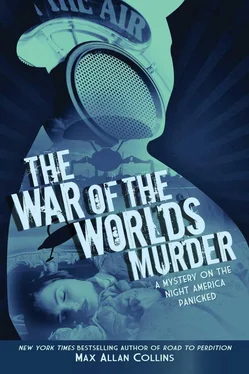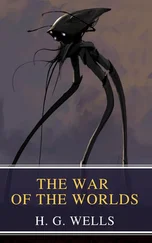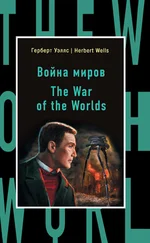Max Collins - The War of the Worlds Murder
Здесь есть возможность читать онлайн «Max Collins - The War of the Worlds Murder» весь текст электронной книги совершенно бесплатно (целиком полную версию без сокращений). В некоторых случаях можно слушать аудио, скачать через торрент в формате fb2 и присутствует краткое содержание. Жанр: Исторический детектив, на английском языке. Описание произведения, (предисловие) а так же отзывы посетителей доступны на портале библиотеки ЛибКат.
- Название:The War of the Worlds Murder
- Автор:
- Жанр:
- Год:неизвестен
- ISBN:нет данных
- Рейтинг книги:5 / 5. Голосов: 1
-
Избранное:Добавить в избранное
- Отзывы:
-
Ваша оценка:
- 100
- 1
- 2
- 3
- 4
- 5
The War of the Worlds Murder: краткое содержание, описание и аннотация
Предлагаем к чтению аннотацию, описание, краткое содержание или предисловие (зависит от того, что написал сам автор книги «The War of the Worlds Murder»). Если вы не нашли необходимую информацию о книге — напишите в комментариях, мы постараемся отыскать её.
The War of the Worlds Murder — читать онлайн бесплатно полную книгу (весь текст) целиком
Ниже представлен текст книги, разбитый по страницам. Система сохранения места последней прочитанной страницы, позволяет с удобством читать онлайн бесплатно книгу «The War of the Worlds Murder», без необходимости каждый раз заново искать на чём Вы остановились. Поставьте закладку, и сможете в любой момент перейти на страницу, на которой закончили чтение.
Интервал:
Закладка:
With Koch seated at his side, Gibson listened to the rehearsal and went through several more Camels; because they were recording, no stops could be made-the invasion from Mars went forward even with flubs.
The adaptation of the Wells novella began imaginatively enough with a news bulletin interrupting a remote broadcast of a dance band. Then a second bulletin took reporter Carl Phillips (former Shadow, Frank Readick) to the Princeton Observatory to interview Professor Pierson, played by a small man with a big voice. Soon the two men were at the scene, and a more or less conventional fantasy melodrama played out.
When it was finished, director Stewart emerged from the adjacent control booth to speak to Koch, with Gibson still at the radio writer’s side.
“Well?” Stewart asked.
“It wasn’t terrible,” Koch said.
“No,” Stewart admitted. “It was worse than terrible: it wasn’t good.” The director pulled a chair up. He looked to his guest. “What do you think, Walter?”
“I don’t know that my opinion matters.”
“I’d like to hear it.”
“Well, you don’t have the sound effects perfected yet….”
“No,” Stewart granted. “We’ll be doing that on Saturday. Ora’s the best-the effects’ll be first-rate by air.”
“Good. And that one actor was obviously filling in for Orson.”
“Yes. Bill Alland. He always sits in for Orson on these rehearsals.”
“He’s not bad, but Orson’s a star, with the greatest voice in radio. He’ll sell this.”
Stewart nodded. “What works for you? What doesn’t?”
Gibson shrugged. “It starts out great. Those news bulletins are compelling. I like the bit, after the Holocaust, where the ham radio fella is wondering if he’s the last person on earth, alive.” He glanced at Koch. “All that plays into the immediacy of the medium that you were talking about.”
Stewart grunted. “More bulletins, you think?” He seemed to be asking Gibson as much as Koch.
Koch threw up his hands. “We better wait for Orson on this. He’ll have an opinion.”
Stewart arched a dark eyebrow. “ An opinion?”
Everyone stood, and after some small talk, Gibson was about to take his leave when Stewart was called to the phone. Since good-byes hadn’t been exchanged yet, Gibson waited politely. Stewart returned a few minutes later.
“That was Orson,” the director said. “He’s tied up at the theater working on Danton’s Death -the new play. I told him you sat through the rehearsal, Walter, and he’d like you to join us when we listen to the acetate, and help us brainstorm over how to fix this thing.”
“Well…I’d be glad to. It’s an honor.”
Koch smirked. “Not really. Orson loves to charm free help out of professionals.”
Gibson lifted one shoulder in a shrug. “I’m on expense account. What time?”
Stewart sighed. “That’s the bad part-can you make five A.M. over at the Mercury Theatre?”
“Sure.” Gibson shook his head, and chortled, “But I didn’t figure a theater-type like Orson Welles for such an early hour.”
“More like late,” Stewart said. “He’ll probably still be rehearsing the cast when we get there….”
FRIDAY
On M ay 6, 1915, Orson Welles was born in Kenosha, Wisconsin, not far from Chicago, Illinois. His family was well-off, even well-to-do, his father an inventor and a hotelier, his mother a renowned pianist. From early childhood, he was surrounded by friends of the family who were intellectuals and artists-musicians, writers, actors, painters, and the occasional industrialist. He was welcomed as a prodigy, a child genius, and Orson lived up to the challenge. Before long a headline in a Madison newspaper was proclaiming him: “Cartoonist, Actor, Poet-and Only Ten!”
“My father,” he once said, “was a gentle, sensitive soul whose kindness, generosity and tolerance made him much beloved…. From him I inherited the love of travel, which has become ingrained within me. From my mother I inherited a real and lasting love of music and the spoken word, without which no human being is really a complete and satisfactory person.”
His father, however, often travelled without him; and his mother died within days of the boy’s ninth birthday. His guardian, Dr. Maurice Bernstein (a former lover of Orson’s mother), shared with the parents a belief in the boy’s genius-Bernstein gave the child a conductor’s baton at age three. The guardian (“Dadda,” Orson called him) also introduced young Orson to magic tricks, and gave him a puppet theater where the precocious one could concoct his own shows .
He was fifteen when his father died, and his youth thereafter was spent in a series of progressive schools; by high school he was an old hand at producing Shakespeare, coming up with a version of Julius Caesar that won top prize from the Chicago Drama League for a student production (once the jury had been shown proof that the young actors were not professionals) .
At sixteen, he set out from the latest of these schools for Europe with five hundred dollars and a dream of becoming an artist-he had painted and drawn since age two. He wound up in Dublin, broke-travelling by donkey cart, paying his way with his artwork after the money ran out-and presented himself to the prestigious Gate Theatre company as an American Broadway star, “the sensation of the New York Theatre Guild.”
His confidence was credible, if not his story, and soon in this old city with its rich theatrical tradition, the young actor was on stage, winning good notices-playing a duke, the ghost in Hamlet, and even the King of Persia. Soon offers came from England, but when the boy tried to follow up on these opportunities, the Ministry of Labor refused a work permit, and Orson Welles returned to America, a seasoned veteran of the Dublin stage .
But Broadway was-initially-unimpressed, and young Welles sought theatrical satisfaction offstage, creating an annotated stage edition of Shakespeare’s works (The Mercury Shakespeare) and returning to the pursuit of painting, first in Morocco, then Spain. When playwright Thornton Wilder recommended him to Katharine Cornell, the celebrated actress hired him to appear in touring productions of The Barretts of Wimpole Street and Romeo and Juliet.
Operating out of Chicago, Welles further dabbled in theater in nearby rural Woodstock, organizing a festival through the Todd School, one of the progressive institutions he’d attended as a child. In addition to attracting attention, and making his first short film, Welles won a wife, a lovely and privileged eighteen-year-old actress, Virginia Nicholson .
His touring for Katharine Cornell finally led to Broadway, where a struggling producer-John Houseman-saw the teenager’s performance as Tybalt in Romeo and Juliet, and knew at once his own destiny would be bound up with that of this “monstrous boy-flatfooted and graceless, yet swift and agile…from which issued a voice of such clarity and power that it tore like a high wind through the genteel, modulated voices of the well-trained professionals around him.”
At thirty-three, the balding, stocky former Jacques Haussmann-born in Bucharest to an English mother and French father, a successful grain merchant turned Broadway writer/producer/director-was at a personal crossroads. Despite an intimidating bearing, including the accent of a cultured English gentleman, Houseman had little confidence in himself-“My shame and fear were almost unbearable, my ineptitude so glaring”-and in the nineteen-year-old Welles, Houseman saw in full bloom the qualities he himself lacked .
Читать дальшеИнтервал:
Закладка:
Похожие книги на «The War of the Worlds Murder»
Представляем Вашему вниманию похожие книги на «The War of the Worlds Murder» списком для выбора. Мы отобрали схожую по названию и смыслу литературу в надежде предоставить читателям больше вариантов отыскать новые, интересные, ещё непрочитанные произведения.
Обсуждение, отзывы о книге «The War of the Worlds Murder» и просто собственные мнения читателей. Оставьте ваши комментарии, напишите, что Вы думаете о произведении, его смысле или главных героях. Укажите что конкретно понравилось, а что нет, и почему Вы так считаете.

![Герберт Уэллс - The War of the Worlds [С англо-русским словарем]](/books/26611/gerbert-uells-the-war-of-the-worlds-s-anglo-thumb.webp)










